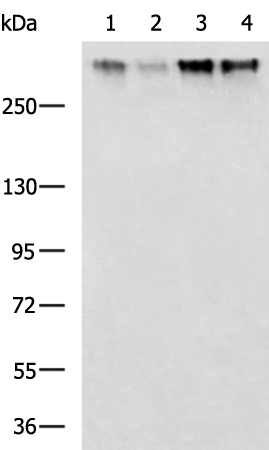
| WB | 咨询技术 | Human,Mouse,Rat |
| IF | 咨询技术 | Human,Mouse,Rat |
| IHC | 咨询技术 | Human,Mouse,Rat |
| ICC | 技术咨询 | Human,Mouse,Rat |
| FCM | 咨询技术 | Human,Mouse,Rat |
| Elisa | 1/5000-1/10000 | Human,Mouse,Rat |
| Aliases | IGS; IFCR; IGS1; MGA1; gp280 |
| WB Predicted band size | 399 kDa |
| Host/Isotype | Rabbit IgG |
| Antibody Type | Primary antibody |
| Storage | Store at 4°C short term. Aliquot and store at -20°C long term. Avoid freeze/thaw cycles. |
| Species Reactivity | Human, Mouse, Rat |
| Immunogen | Synthetic peptide of human CUBN |
| Formulation | Purified antibody in PBS with 0.05% sodium azide and 50% glycerol. |
+ +
以下是3-4篇关于CUBN抗体的代表性文献及其摘要概括:
---
1. **文献名称**:*Cubilin dysfunction causes abnormal metabolism of vitamin B12 in the kidney*
**作者**:Kozyraki, R., et al.
**摘要**:研究探讨了CUBN编码的cubilin蛋白在肾脏维生素B12吸收中的作用,利用特异性抗体检测发现CUBN缺失或突变会导致维生素B12代谢异常,与遗传性巨幼细胞贫血相关。
---
2. **文献名称**:*Structural insights into the role of cubilin in albumin reabsorption*
**作者**:Andersen, C.B., et al.
**摘要**:通过冷冻电镜和CUBN抗体标记技术,解析了cubilin与肾脏近端小管白蛋白重吸收相关的结构机制,揭示了其在蛋白尿疾病中的潜在病理意义。
---
3. **文献名称**:*Cubilin is a novel target for autoantibodies in autoimmune kidney disease*
**作者**:Yamamoto, S., et al.
**摘要**:研究发现部分自身免疫性肾病患者血清中存在抗CUBN抗体,这些抗体可能通过干扰cubilin介导的蛋白重吸收功能,加剧肾小管损伤。
---
4. **文献名称**:*Genetic variants in CUBN are associated with chronic kidney disease*
**作者**:Böger, C.A., et al.
**摘要**:通过全基因组关联分析(GWAS)和CUBN抗体免疫组化验证,发现CUBN基因多态性与慢性肾病风险相关,提示cubilin功能异常可能参与肾小球滤过屏障破坏。
---
以上文献覆盖了CUBN在维生素代谢、结构解析、自身免疫疾病和遗传关联中的研究,均涉及抗体在机制探索或疾病诊断中的应用。如需具体DOI或年份可进一步补充。
The cubilin antibody targets cubilin (CUBN), a large extracellular glycoprotein functioning as a multifunctional receptor in the kidneys and small intestine. Cubilin, encoded by the *CUBN* gene, plays critical roles in protein reabsorption and vitamin uptake. Structurally, it contains multiple CUB domains and epidermal growth factor-like repeats, enabling interactions with ligands such as albumin, transferrin, and intrinsic factor-vitamin B12 complexes. In the kidney, cubilin is expressed in proximal tubular epithelial cells, where it collaborates with megalin (LRP2) to mediate endocytic reabsorption of filtered proteins and vitamins. In the intestine, it facilitates vitamin B12 absorption by binding the intrinsic factor-B12 complex.
Antibodies against cubilin are essential tools for studying its expression, localization, and function in physiological and pathological contexts. They are widely used in techniques like immunohistochemistry, Western blotting, and immunofluorescence to investigate cubilin's role in renal diseases (e.g., proteinuria, diabetic nephropathy) and intestinal disorders (e.g., Imerslund-Gräsbeck syndrome, a rare genetic vitamin B12 deficiency). Additionally, CUBN antibodies aid in exploring cubilin’s involvement in cellular signaling pathways and its potential as a biomarker for kidney dysfunction. Research also focuses on cubilin’s interaction with pathogens, such as *Streptococcus pneumoniae*, which exploits cubilin for cellular invasion. Understanding cubilin’s molecular mechanisms through antibody-based studies continues to inform therapeutic strategies targeting receptor-mediated endocytosis and nutrient metabolism.
×